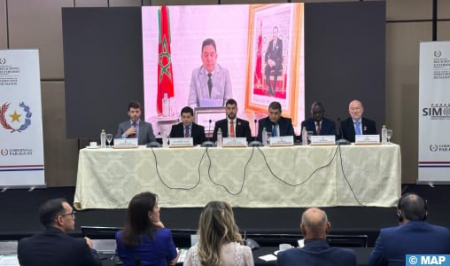

HM the King Has Turned Human Rights Protection into ‘Foundation of Modern, Just and Peaceful Society’ – Bourita
In a message broadcasted before the 2nd International Seminar on National Mechanisms for the Implementation and Reporting on Human Rights (Asunción, May 8-9), Bourita expressed his satisfaction with this gathering, which “takes place just one year after the one in Marrakech in December 2022, and which, in continuity with the latter, will work towards creating an international network of national mechanisms for the implementation and reporting on human rights,” adding that the principle of this network is included in a joint commitment made by Morocco, Paraguay, and Portugal.
The minister believed that “this convergence is not insignificant. It is the result of a common commitment to the promotion and protection of human rights. It also proves that strong bilateral relations, based on mutual trust and shared values, can drive significant progress on the international stage.”
In this respect, the Moroccan foreign minister further emphasized that “this convergence is all the more significant as it emanates from three countries from three different continents, each with its own history and trajectory.”
Noting that the protection of human rights “knows no respite,” Bourita asserted that “Morocco is proud to take part in it,” adding that “it does so with the utmost conviction.”
“This commitment of Morocco indeed stems from the High Directions of His Majesty King Mohammed VI, who has made the protection and promotion of human rights the foundation of a modern, just, and peaceful society.”
Highlighting that human rights have been at the heart of the major projects initiated by His Majesty the King, the minister cited the examples of the Family Code, the National Initiative for Human Development (INDH), the Development Model of the Southern Provinces, the New Development Model, and the generalization of social protection.
According to the minister, “these major national projects have also relied on a solid institutional architecture of human rights,” as upheld by the 2011 Constitution, a “true national charter of human rights” which has enabled the establishment of major constitutional institutions embodying this fight for human rights in all its diversity (National Human Rights Council, Mediator, and the National Authority for the Fight against Discrimination).
Morocco, which has invested in the transposition of international human rights instruments into its domestic legal order, the minister indicated, “has not only contented itself with this appropriation; it has also engaged in sincere dialogue and proactive cooperation in the field of human rights.”
In this context, the Kingdom “spares no effort to maintain a policy of positive and proactive interaction with international human rights mechanisms,” by constantly, transparently, and systematically communicating with these bodies, actively participating in periodic reviews, and regularly submitting national reports to the UN human rights system.
An example of this constructive approach of authenticity and constant improvement is “the National Mechanism dedicated to the implementation, reporting, and follow-up of International Human Rights Recommendations (MNMRS), which was initiated by His Majesty the King and has placed Morocco among the pioneering countries in this field,” noted the minister.
Over the course of 13 years, the Interministerial Delegation for Human Rights (DIDH) has been able to develop a harmonious approach that allows for dynamic interaction between Morocco and UN human rights bodies and coordinates governmental action by integrating a human rights-based approach.
This approach of the DIDH has enabled it to engage in cooperative relations, exchange of expertise, and capacity building with sister institutions worldwide and to implement the national action plan for democracy and human rights, which is in its second phase of implementation and represents a unique roadmap.
“There is, in short, something entirely natural in Morocco’s investment in the process of creating the network of NMRS,” insisted the minister, emphasizing that the “Marrakech Declaration,” which concluded the seminar on December 8, 2022, “marked a new phase for national human rights mechanisms, notably by emphasizing the importance of establishing close links between capacity-building programs for national mechanisms and mobilizing technical assistance.”
“If Marrakech laid the groundwork for our collective action, Asunción marks the stage of formalization and structuring of the Network, which will be called upon to deploy across all continents,” continued the minister, expressing Morocco’s willingness to contribute to the establishment of a peer-to-peer learning program with the support of the Office of the High Commissioner for Human Rights, to allow states wishing to establish an NMRS to benefit from the experience of their counterparts.
Morocco also proposes the launch of a digital platform, as a milestone of the digital community envisaged by this initiative, as well as the establishment of a Secretariat that will be the institutional memory of this initiative.
“The Kingdom of Morocco is fully committed to continuing this effort to increase the impact and visibility of the network of national mechanisms for the implementation and reporting on human rights. It is indeed from this interaction between national and international actors, from this dialogue between the universal and the particular, that the greatest advances in human rights will arise,” concluded the minister.
The Asunción seminar’s main objective is the creation of an international network of national mechanisms, an idea that was launched in Geneva during the celebration of the 75th anniversary of the Universal Declaration of Human Rights.
The Moroccan delegation participating in this seminar consists of the Secretary-General of the DIDH, Abdelkarim Boujradi, the Ambassador of Morocco to Paraguay, Badreddine Abdelmoumni, and Moujahid Abbadi, a counselor within the DIDH.



